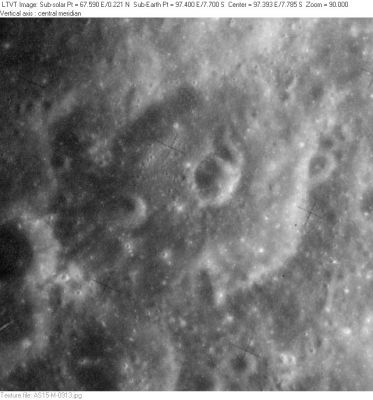Ludwig
Contents
Ludwig
| Lat: 7.7°S, Long: 97.4°E, Diam: 23 km, Depth: km, Rükl: (farside) |
Images
LPOD Photo Gallery Lunar Orbiter Images Apollo Images
- Orbital Hasselblad photograph AS8-17-2770, made during the mission of Apollo 8 in december 1968, shows Ludwig and its environs without shadows (scan photograph: David Woods and Frank O'Brien, Apollo 8 Flight Journal).
- AS12-55-8142, made during the mission of Apollo 12 in november 1969, also shows Ludwig, east-southeast of Hirayama.
- Apollo 15's panoramic ITEK-camera frames AS15-P-9699 and AS15-P-9704 show Ludwig and the small crater on its floor near the right margins of both frames (a little bit to the left of the high-albedo bowl shaped crater immediately north of Ludwig). Remember; north is to the right on all of the LPI's scans of the ITEK-frames! If you want to explore these online photographs together with the Clementine photographs in B.Bussey's and P.Spudis's Clementine Atlas, you have to hold this book upside-down!
- To detect the location of Ludwig at the very centre of Apollo 17's orbital panoramic ITEK-camera frame AS17-P-2857 is quite an adventurous performance (it's not a very easy crater!).
Research orbital Apollo photography: Danny Caes
Maps
Description
Description: Wikipedia
Additional Information
Nomenclature
Carl Friedrich Wilhelm; German physiologist (1816-1895).
- Although Ludwig appears in the cumulative list of approved names in IAU Transactions XVB, it is not clear precisely when and where this name (which serves as the chart title for LTO 82A3) was approved. - Jim Mosher
- Southeast of Ludwig is a crater which is called Racine on LTO 82-D2. Who was Racine? See this Wikipedia-page.
LPOD Articles
Bibliography
